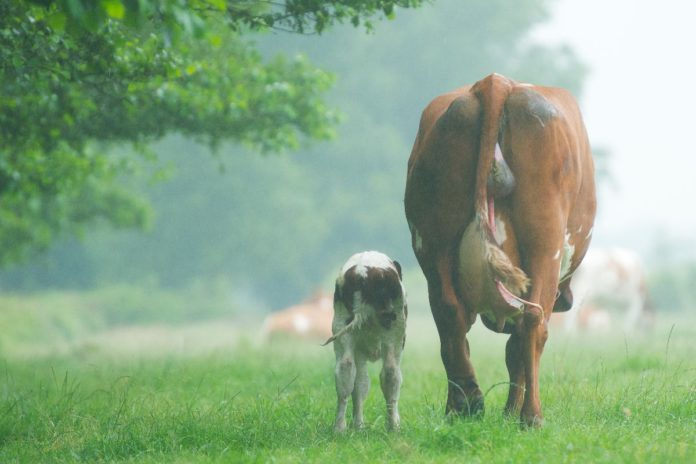Calving will start in most spring-calving herds in the coming months, writes CAFRE’s Nigel Gould.
Prepare in advance of the busy period by having facilities and supplies ready.
Having adequate facilities and avoiding a last-minute rush will reduce stress and the likelihood of farm accidents related to cows at calving time.
A general rule of thumb is to allow one calving pen for every ten cows. However, more will be required where a very compact calving is anticipated.
Every suckler farm should have a good calving gate, including a part that can be opened to allow the safe assistance of calves to suckle.
Essential items include:
- Calving aids/ropes;
- Iodine solution for navels;
- Arm length gloves;
- Calving lubricant;
- Disinfectant;
- Artificial/frozen colostrum;
- A stomach tube;
- feeding bottle.
Have plenty of straw in store. Use plenty in the calving pens, disinfect and clean out between calvings to minimise disease build-up in the shed.
After the calf is born, treat navels with a strong iodine solution.
Colostrum
Ensure an adequate quantity of colostrum is consumed by the calf as soon as possible after birth (10% of calf body weight within six hours).
The ability of a newborn calf to absorb antibodies from colostrum deteriorates rapidly from birth.
If thawing frozen colostrum, do so in good time. Freezing in bags or containers with larger surface areas will reduce thawing time. Overheating will destroy antibodies. Never use a microwave to defrost colostrum.
Be mindful of the risk of bringing disease into your herd via colostrum from another herd.
Other note:
Calved cows can become aggressive in protecting their young, writes FRS.
Remain vigilant at all times and make sure others living or working on the farm are aware of the dangers.
Organisation can help prevent accidents. Ensure you can safely secure cows for handling and watch for signs of danger. Always create a barrier between you and the animal and have a clear exit route at all times.
Lastly, farmers also need to look after themselves. Get as much rest as possible in advance of the busy period and if you feel that the workload will be too much, ask for help.





